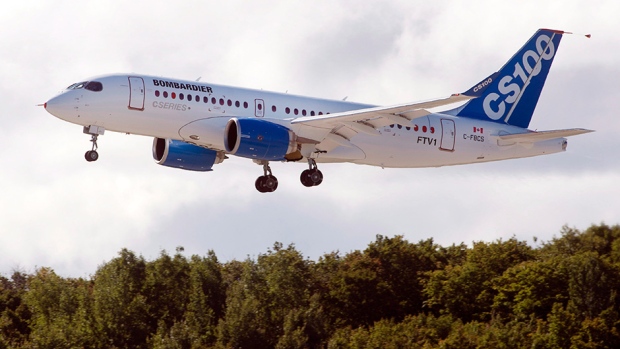Oct 6, 2017
U.S. hits Bombardier with another round of duties
, Reuters

WASHINGTON — The U.S. Commerce Department on Friday moved to impose trade duties of nearly 300 per cent on sales of Bombardier Inc (BBDb.TO) CSeries jets in the United States, prompted by Boeing Co's (BA.N) complaint that the Canadian company received illegal subsidies and dumped the planes at "absurdly low" prices.
The Commerce Department proposed a 79.82 per cent antidumping duty after a preliminary finding that the jets were sold below cost to Delta Air Lines Inc (DAL.N) in 2016. That adds to the 219.63-per-cent duty for subsidies announced last week.
“The United States is committed to free, fair and reciprocal trade with Canada, but this is not our idea of a properly functioning trading relationship,” said U.S. Commerce Secretary Wilbur Ross in a press release.
The new proposed penalty, which would not take effect unless affirmed by the U.S. International Trade Commission early next year, is nevertheless expected to heighten trade tensions between the United States, Canada and Britain, where wings for the Bombardier jetliner are made.
Bombardier called the decision “an egregious overreach and misapplication of the U.S. trade law.”
“The Commerce Department’s approach throughout this investigation has completely ignored aerospace industry realities,” Bombardier said in a statement. “Boeing’s own program cost accounting practices — selling aircraft below production costs for years after launching a program — would fail under Commerce’s approach. This hypocrisy is appalling, and it should be deeply troubling to any importer of large, complex, and highly engineered products.”
The total duty was well above the 80-per-cent duty Boeing sought in its complaint.
"We are extremely disappointed by and in complete disagreement with the U.S. Department of Commerce's preliminary determination in the anti-dumping investigation of expoerts of large aircraft from Canada," Minister of Foreign Affairs Chrystia Freeland wrote in a statement.
“These anti-dumping duties on Bombardier’s CSeries aircraft unfairly target Canada’s highly innovative aerospace sector and its more than 200,000 workers — and put at risk the almost 23,000 U.S. jobs that depend on Bombardier and its suppliers," Freeland also said.
After the first duty was announced on Sept. 26, Canada and Britain threatened to avoid buying Boeing military equipment, saying duties on the CSeries would reduce U.S. sales and put thousands of Bombardier jobs in their countries at risk.
The duty would apply to the cost of CSeries planes imported to the United States, effectively keeping it out of the market.
Bombardier shares were last down 0.5 per cent to $2.18.
Boeing applauded the decision in a statement, calling Bombardier's CSeries pricing "an illegal effort to grab market share in the U.S. single-aisle airplane market."
"This was an avoidable outcome within Bombardier’s control," the statement read. "These duties are the consequence of a conscious decision by Bombardier to violate trade law and dump their C Series aircraft to secure a sale. This dumping in our home market was not a situation Boeing could ignore, and we’re now simply asking for laws already on the books to be enforced."
Echoing remarks from its statement last week, Delta noted the decision was preliminary and said it was confident regulators "will conclude that no U.S. manufacturer is at risk" from Bombardier's plane.
With files from BNN




